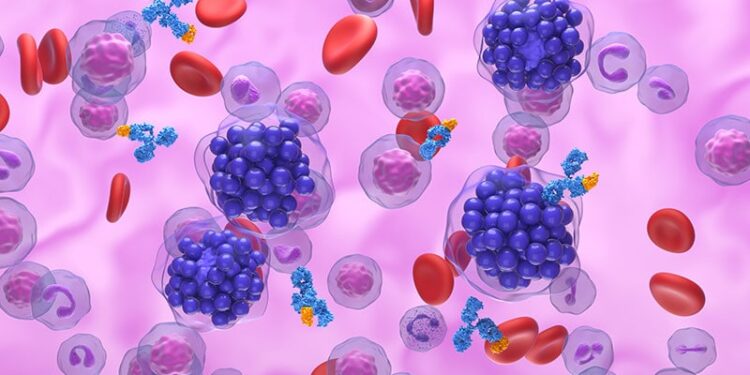TOPLINE:
Lisocabtagene maraleucel demonstrated superior efficacy, with a median event-free survival of 29.5 months compared to 2.4 months for standard of care in second-line large B-cell lymphoma (LBCL). The 36-month overall survival rate reached 63% for lisocabtagene maraleucel vs 52% for standard care, with progression-free survival rates of 51% vs 26.5%, respectively.
METHODOLOGY:
- A total of 184 adults eligible for autologous stem cell transplantation were randomly assigned 1:1 to receive either lisocabtagene maraleucel or standard of care.
- Participants in the lisocabtagene maraleucel arm received a target dose of 100 × 106 chimeric antigen receptor-positive (CAR) T cells, while the standard-of-care arm received three cycles of protocol-defined immunochemotherapy, followed by high-dose chemotherapy and autologous stem cell transplantation.
- Bridging therapy was permitted at investigator discretion for disease control during lisocabtagene maraleucel manufacturing.
- The study was conducted following Declaration of Helsinki guidelines, International Conference on Harmonisation Good Clinical Practice guidelines, and applicable regulatory requirements.
TAKEAWAY:
- Median event-free survival was 29.5 months for lisocabtagene maraleucel vs 2.4 months for standard of care (hazard ratio [HR], 0.375; 95% CI, 0.259-0.542).
- Median progression-free survival was not reached for lisocabtagene maraleucel vs 6.2 months for standard of care, with 36-month rates of 51% vs 26.5%.
- The 36-month overall survival rate was 63% for lisocabtagene maraleucel vs 52% for standard of care.
- At 3-year follow-up, lisocabtagene maraleucel demonstrated superior, more durable efficacy vs standard of care with a favorable safety profile and no new safety signals.
IN PRACTICE:
“These results provide long-term evidence to support liso-cel [lisocabtagene maraleucel] as an effective second-line treatment with curative potential for patients with primary refractory/early relapsed LBCL,” the authors of the study wrote.
SOURCE:
The study was led by Manali Kamdar, MD, MBBS, University of Colorado Cancer Center in Aurora, Colorado. It was published online in Journal of Clinical Oncology.
LIMITATIONS:
When interpreting overall survival data, the crossover design of the study needs to be considered. Additionally, the study was not powered to evaluate statistical differences in overall survival between treatment arms due to limited number of events in both groups.
DISCLOSURES:
The study was supported by Celgene, a Bristol Myers Squibb Company. Additional disclosures are noted in the original article.
This article was created using several editorial tools, including AI, as part of the process. Human editors reviewed this content before publication.
Source link : https://www.medscape.com/viewarticle/car-t-excels-second-line-lymphoma-care-2025a1000m4a?src=rss
Author :
Publish date : 2025-08-21 12:04:00
Copyright for syndicated content belongs to the linked Source.



